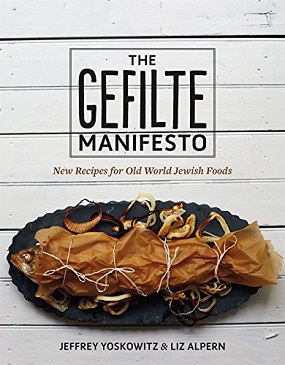The Gefilte Manifesto
The Gefilte Manifesto: New Recipes for Old World Jewish Foods is a cookbook that aims to revitalize Jewish culinary traditions for the modern age. Authored by Jeffrey Yoskowitz and Liz Alpern, the book was published in 2016 and has since garnered attention for its innovative approach to traditional Jewish cooking. The manifesto not only offers recipes but also delves into the cultural and historical contexts of Jewish cuisine, making it a comprehensive guide for anyone looking to explore this rich culinary heritage.
Overview[edit | edit source]
The Gefilte Manifesto challenges the notion that Jewish food is limited to the often stereotyped dishes of Ashkenazi origin, such as gefilte fish, matzo ball soup, and brisket. Instead, it presents a broad spectrum of recipes that reflect the diverse palette of Jewish cuisine, including Sephardic, Mizrahi, and Ashkenazi traditions. The book is structured around the Jewish calendar, offering dishes suitable for Shabbat, Passover, Rosh Hashanah, and other holidays, as well as everyday meals.
Authors[edit | edit source]
Jeffrey Yoskowitz and Liz Alpern are both seasoned professionals in the food industry, with a particular focus on Jewish cuisine. They co-founded The Gefilteria, a culinary venture that seeks to innovate traditional Jewish foods while respecting their origins. Their work, including The Gefilte Manifesto, is part of a larger movement to reinvigorate Jewish culinary culture and make it accessible to a new generation.
Reception[edit | edit source]
Since its publication, The Gefilte Manifesto has received critical acclaim for its fresh take on Jewish cooking. Food critics and readers alike have praised the book for its thoughtful exploration of Jewish culinary history and its creative, accessible recipes. It has been featured in various food and culture publications, highlighting its contribution to the ongoing conversation about Jewish food and identity.
Recipes[edit | edit source]
The recipes in The Gefilte Manifesto range from traditional favorites to modern adaptations, all designed with contemporary cooks in mind. Highlights include updated versions of gefilte fish, creative takes on kugel, and inventive desserts that draw on Jewish culinary traditions. The book also offers guidance on sourcing ingredients and tips for cooking techniques, making it a valuable resource for both novice and experienced cooks.
Cultural Significance[edit | edit source]
Beyond its recipes, The Gefilte Manifesto serves as a cultural document, exploring the ways in which food is intertwined with Jewish identity, history, and community. The authors' emphasis on sustainable cooking practices and their advocacy for rediscovering forgotten dishes contribute to a broader dialogue about food ethics, heritage, and the future of culinary traditions.
Conclusion[edit | edit source]
The Gefilte Manifesto is more than a cookbook; it is a call to action for preserving and innovating Jewish culinary traditions. Through its recipes and narratives, it invites readers to explore the rich tapestry of Jewish cuisine and to participate in its ongoing evolution. As such, it is a significant contribution to the world of Jewish cooking and to the broader culinary landscape.
Search WikiMD
Ad.Tired of being Overweight? Try W8MD's physician weight loss program.
Semaglutide (Ozempic / Wegovy and Tirzepatide (Mounjaro / Zepbound) available.
Advertise on WikiMD
|
WikiMD's Wellness Encyclopedia |
| Let Food Be Thy Medicine Medicine Thy Food - Hippocrates |
Translate this page: - East Asian
中文,
日本,
한국어,
South Asian
हिन्दी,
தமிழ்,
తెలుగు,
Urdu,
ಕನ್ನಡ,
Southeast Asian
Indonesian,
Vietnamese,
Thai,
မြန်မာဘာသာ,
বাংলা
European
español,
Deutsch,
français,
Greek,
português do Brasil,
polski,
română,
русский,
Nederlands,
norsk,
svenska,
suomi,
Italian
Middle Eastern & African
عربى,
Turkish,
Persian,
Hebrew,
Afrikaans,
isiZulu,
Kiswahili,
Other
Bulgarian,
Hungarian,
Czech,
Swedish,
മലയാളം,
मराठी,
ਪੰਜਾਬੀ,
ગુજરાતી,
Portuguese,
Ukrainian
Medical Disclaimer: WikiMD is not a substitute for professional medical advice. The information on WikiMD is provided as an information resource only, may be incorrect, outdated or misleading, and is not to be used or relied on for any diagnostic or treatment purposes. Please consult your health care provider before making any healthcare decisions or for guidance about a specific medical condition. WikiMD expressly disclaims responsibility, and shall have no liability, for any damages, loss, injury, or liability whatsoever suffered as a result of your reliance on the information contained in this site. By visiting this site you agree to the foregoing terms and conditions, which may from time to time be changed or supplemented by WikiMD. If you do not agree to the foregoing terms and conditions, you should not enter or use this site. See full disclaimer.
Credits:Most images are courtesy of Wikimedia commons, and templates Wikipedia, licensed under CC BY SA or similar.
Contributors: Prab R. Tumpati, MD

